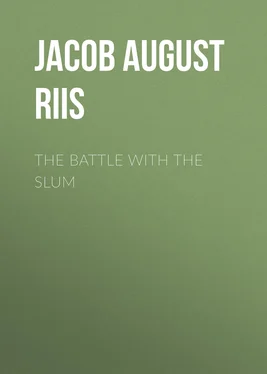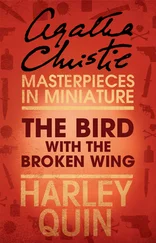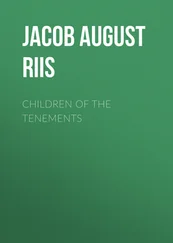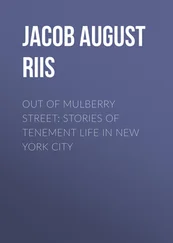Jacob August Riis - The Battle with the Slum
Здесь есть возможность читать онлайн «Jacob August Riis - The Battle with the Slum» — ознакомительный отрывок электронной книги совершенно бесплатно, а после прочтения отрывка купить полную версию. В некоторых случаях можно слушать аудио, скачать через торрент в формате fb2 и присутствует краткое содержание. Жанр: foreign_prose, sociology_book, foreign_antique, на английском языке. Описание произведения, (предисловие) а так же отзывы посетителей доступны на портале библиотеки ЛибКат.
- Название:The Battle with the Slum
- Автор:
- Жанр:
- Год:неизвестен
- ISBN:нет данных
- Рейтинг книги:3 / 5. Голосов: 1
-
Избранное:Добавить в избранное
- Отзывы:
-
Ваша оценка:
- 60
- 1
- 2
- 3
- 4
- 5
The Battle with the Slum: краткое содержание, описание и аннотация
Предлагаем к чтению аннотацию, описание, краткое содержание или предисловие (зависит от того, что написал сам автор книги «The Battle with the Slum»). Если вы не нашли необходимую информацию о книге — напишите в комментариях, мы постараемся отыскать её.
The Battle with the Slum — читать онлайн ознакомительный отрывок
Ниже представлен текст книги, разбитый по страницам. Система сохранения места последней прочитанной страницы, позволяет с удобством читать онлайн бесплатно книгу «The Battle with the Slum», без необходимости каждый раз заново искать на чём Вы остановились. Поставьте закладку, и сможете в любой момент перейти на страницу, на которой закончили чтение.
Интервал:
Закладка:
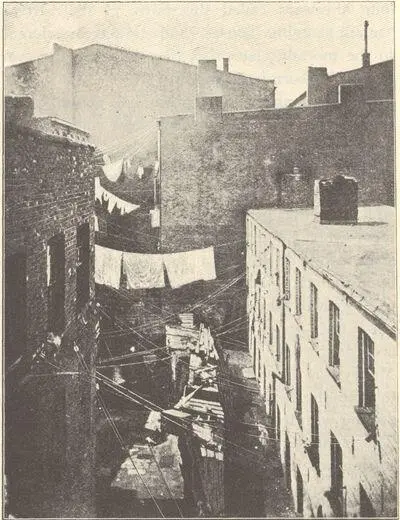
The Rear Tenement grows up. An Alley condemned by the Council of Hygiene.
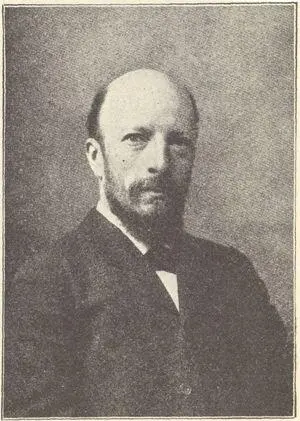
Professor Felix Adler.
The story shocked the town into action. Plans for a better kind of tenement were called for, and a premium was put on every ray of light and breath of air that could be let into it. It was not much, for the plans clung to the twenty-five-foot lot which was the primal curse, and the type of tenement evolved, the double-decker of the "dumb-bell" shape, while it seemed at the time a great advance upon the black, old packing-box kind, came with the great growth of our city to be a worse peril than what had gone before. But what we got was according to our sense. At least the will was there. Money was raised to build model houses, and a bill to give the health authorities summary powers in dealing with tenements was sent to the legislature. The landlords held it up until the last day of the session, when it was forced through by an angered public opinion, shorn of its most significant clause, which proposed the licensing of tenements and so their control and effective repression. However, the landlords had received a real set-back. Many of them got rid of their property, which in a large number of cases they had never seen, and tried to forget the source of their ill-gotten wealth. Light and air did find their way into the tenements in a half-hearted fashion, and we began to count the tenants as "souls." That is another of our milestones in the history of New York. They were never reckoned so before; no one ever thought of them as "souls." So, restored to human fellowship, in the twilight of the air-shaft that had penetrated to their dens, the first Tenement House Committee 11 11 The Adler Tenement House Committee of 1884. It was the first citizens' commission. The legislative inquiry of 1856 was conducted by a Select Committee of the Assembly.
was able to make them out "better than the houses" they lived in, and a long step forward was taken. The Mulberry Bend, the wicked core of the "bloody Sixth Ward," was marked for destruction, and all slumdom held its breath to see it go. With that gone, it seemed as if the old days must be gone too, never to return. There would not be another Mulberry Bend. As long as it stood, there was yet a chance. The slum had backing, as it were.
What was it like? says a man at my elbow, who never saw it. Like nothing I ever saw before, or hope ever to see again. A crooked three-acre lot built over with rotten structures that harbored the very dregs of humanity. Ordinary enough to look at from the street, but pierced by a maze of foul alleys, in the depths of which skulked the tramp and the outcast thief with loathsome wrecks that had once laid claim to the name of woman. Every foot of it reeked with incest and murder. Bandits' Roost, Bottle Alley, were names synonymous with robbery and red-handed outrage. By night, in its worst days, I have gone poking about their shuddering haunts with a policeman on the beat, and come away in a ferment of anger and disgust that would keep me awake far into the morning hours planning means of its destruction. That was what it was like. Thank God, we shall never see another such!
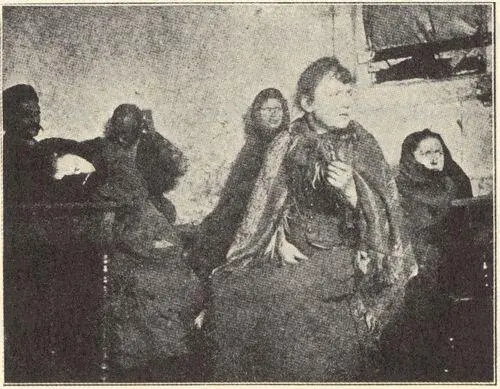
A Cellar Dive in the Bend.
That was the exhibit that urged us on. But the civic conscience was not very robust yet, and required many and protracted naps. It slumbered fitfully eight long years, waking up now and then with a start, while the Bend lay stewing in its slime. I wondered often, in those years of delay, if it was just plain stupidity that kept the politicians from spending the money which the law had put within their grasp; for with every year that passed, a million dollars that could have been used for small park purposes was lost. 12 12 The Small Parks law of 1887 allowed the expenditure of a million dollars a year for the making of neighborhood parks; but only as payment for work done or property taken. If not used in any one year, that year's appropriation was lost.
But they were wiser than I. I understood when I saw the changes which letting in the sunshine worked. They were not of the kind that made for their good. We had all believed it, but they knew it all along. At the same time, they lost none of the chances that offered. They helped the landlords in the Bend, who considered themselves greatly aggrieved because their property was thereafter to front on a park instead of a pigsty, to transfer the whole assessment of half a million dollars for park benefit to the city. They undid in less than six weeks what it had taken considerably more than six years to do; but the park was cheap at the price. We could afford to pay all it cost to wake us up. When finally, upon the wave of wrath excited by the Parkhurst and Lexow disclosures, reform came with a shock that dislodged Tammany, it found us wide awake, and, it must be admitted, not a little astonished at our sudden access of righteousness.
The battle went against the slum in the three years that followed, until it found backing in the "odium of reform" that became the issue in the municipal organization of the greater city. Tammany made notes. The cry meant that we were tired of too much virtue. Of what was done, how it was done, and why, during those years, I shall have occasion to speak further in these pages. Here I wish to measure the stretch we have come since I wrote "How the Other Half Lives," thirteen years ago. Some of it we came plodding, and some at full speed; some of it in the face of every obstacle that could be thrown in our way, wresting victory from defeat at every step; some of it with the enemy on the run. Take it all together, it is a long way. Much of it will not have to be travelled over again. The engine of municipal progress once started as it has been in New York, may slip many a cog with Tammany as the engineer; it may even be stopped for a season; but it can never be made to work backward. Even Tammany knows that, and gropes desperately for a new hold, a certificate of character. In the last election (1901) she laid loud claim to having built many new schools, though she had done little more than to carry out the plans of the previous reform administration, where they could not be upset. As a matter of fact we had fallen behind again, sadly. But even the claim was significant.
How long we strove for those schools, to no purpose! Our arguments, our anger, the anxious pleading of philanthropists who saw the young on the East Side going to ruin, the warning year after year of the superintendent of schools that the compulsory education law was but an empty mockery where it was most needed, the knocking of uncounted thousands of children for whom there was no room,—uncounted in sober fact; there was not even a way of finding out how many were adrift, 13 13 The first school census was taken in 1895 by order of the legislature. It showed that there were 50,069 children of school age in New York City out of school and unemployed. The number had been variously estimated from 5000 to 150,000.
—brought only the response that the tax rate must be kept down. Kept down it was. "Waste" was successfully averted at the spigot; at the bunghole it went on unchecked. In a swarming population like that you must have either schools or jails, and the jails waxed fat with the overflow. The East Side, that had been orderly, became a hotbed of child crime. And when, in answer to the charge made by a legislative committee (1895) that the father forced his child into the shop, on a perjured age certificate, to labor when he ought to have been at play, that father, bent and heavy-eyed with unceasing toil, flung back the charge with the bitter reproach that we gave him no other choice, that it was either the street or the shop for his boy, and that perjury for him was cheaper than the ruin of the child, we were mute. What, indeed, was there to say? The crime was ours, not his. That was seven years ago. Once since then have we been where we could count the months to the time when every child that knocked should find a seat in our schools; but Tammany came back. Once again, now, we are catching up. Yesterday Mayor Low's reform government voted six millions of dollars for new schools. The school census law that was forgotten almost as soon as made (the census was to be taken once in two years, but was taken only twice) is to be enforced again so that we know where we stand. In that most crowded neighborhood in all the world, where the superintendent lately pleaded in vain for three new schools, half a dozen have been built, the finest in this or any other land,—great, light, and airy structures, with playgrounds on the roof; and all over the city the like are going up. The briefest of our laws, every word of which is like the blow of a hammer driving the nails home in the coffin of the bad old days, says that never one shall be built without its playground.
Интервал:
Закладка:
Похожие книги на «The Battle with the Slum»
Представляем Вашему вниманию похожие книги на «The Battle with the Slum» списком для выбора. Мы отобрали схожую по названию и смыслу литературу в надежде предоставить читателям больше вариантов отыскать новые, интересные, ещё непрочитанные произведения.
Обсуждение, отзывы о книге «The Battle with the Slum» и просто собственные мнения читателей. Оставьте ваши комментарии, напишите, что Вы думаете о произведении, его смысле или главных героях. Укажите что конкретно понравилось, а что нет, и почему Вы так считаете.
